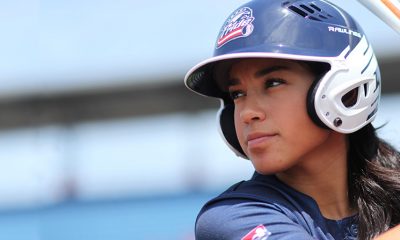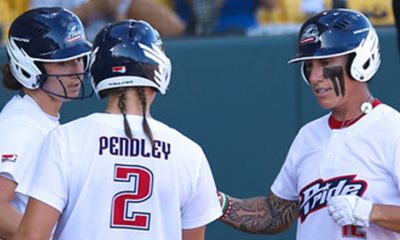
By: Graham Hays
Natasha Watley remembers the first softball game she played. More specifically, she remembers the first time she put bat on ball and tried to run directly to third base. It is the kind of indelible experience that is difficult to forget — not that there is any chance her family would let that happen.
In what turned out to be the final time she put bat on ball, she beat a roller for an RBI single to help her Toyota Motors team win the championship game in the playoffs of the Japanese professional league. It was Nov. 27 of last year, her 35th birthday. When the game was over, for the first time since she ran the wrong way three decades earlier, she realized she was ready to stop.
“It’s time,” Watley said this week. “I’m ready to move on.”
One of the best players in softball history, a four-time first-team All-American at UCLA who won Olympic gold and silver medals for the United States, three world championships and numerous professional titles both in this country and over eight seasons in the Japanese pro league, Watley made it official Wednesday. She retired.
“Natasha Watley was one of the greatest athletes I had the pleasure to watch perform and coach,” said Mike Candrea, who coached her in the Olympics with Team USA and against her in the iconic Pac-12 rivalry between Arizona and UCLA. “She played the game of softball with a tremendous combination of speed and power. She will go down in history as one of our greats to play the game: competitive, humble, talented and a tremendous teammate.”
Which is not to say that she is finished with softball. Watley, who won the batting title in Japan last season, didn’t retire because she is incapable of playing well. Nor was it that she ceased to enjoy playing. She retired in no small part because of a desire to help others gain access to the playing field.
That makes sense for someone whose legacy will be as much about those she brought to the sport as what she did in it.
If Lisa Fernandez is the Ruthian figure in the history of UCLA softball, the college game’s first great dynasty and flagship program, Watley is on any short list for the Westwood versions of Joe DiMaggio, Lou Gehrig and Mickey Mantle. Only two players in NCAA history have more hits than Watley, whose .450 batting average ranks fourth all-time among major conference players. She ranks in the top 20 in career stolen bases and hit 10 home runs as a senior — the complete offensive player Candrea described.
Add her international and pro careers, and Watley paces any argument about the best shortstop of all time. Although the defensive side offers fewer tangible measures, she was a marvel in the field. The same holds true for debates about the best leadoff or slap hitter of all time.
All of that stands on its own. Watley was one of the most accomplished players who ever stepped on a field. Full stop. But by simply being that while being African-American in a sport that has always struggled with diversity, she was afforded the opportunity for influence.
It was an opportunity she ran with.
“When I was going to college, there weren’t very many African-American girls,” said Watley, raised in Southern California, of her softball experience. “Growing up, there weren’t that many African-American girls for me to look up to as role models. I definitely feel like now, across the board, there are a lot of us. I love it. If I broke a barrier, if I made any African-American girls say, ‘I can because Natasha did,’ then that makes me feel proud and excited.”
Now nearly a decade old, the Natasha Watley Foundation states that part of its mission is to “bring the sport of softball to young girls in the nation’s inner cities.” The centerpiece of the effort is the softball league run in conjunction with the city of Los Angeles since 2009. Through youth centers in lower-income, heavily minority areas of south Los Angeles, the summer league last year included 19 teams.
It is a project of passion, but with the league’s ninth season approaching, it is grounded in the hurdles and, at times, frustrations of real life.
“The biggest challenge I’ve had with the girls we’re serving is parents — engaging them,” Watley said. “My parents always gave me access and opportunities. They educated themselves on how to advance me in the sport and how to give me those opportunities. If there was anything I was signed up for, my parents were the ones that made sure I stayed committed and made sure I got there on time and all those things.”
Stepping away from the field offers her the ability to meet those and other challenges. She will help former USA teammate and current Oregon State coach Laura Berg with the U.S. junior national team this summer. She’ll make a few trips to Japan to provide instruction for Toyota. But she learned long ago that the highest levels of the sport aren’t necessarily where the greatest rewards are found.
“It’s rewarding in a different way because I really feel like I’m impacting lives, changing lives,” Watley said of her foundation work. “Some of the girls from my first wave of starting the league are now, like, juniors and seniors in high school and are looking to go to college to play softball. To me, that’s the most rewarding thing because some of these girls didn’t even know what softball was when they started to play. ….
“I just get excited hearing that they’re thinking about going to college, when it might not even have been a thought had they not come across the foundation.”
For nearly a decade, Watley lived a taxing, intercontinental life, playing almost through spring and fall seasons in Japan and summers in National Pro Fastpitch in the United States. Her time in Japan, rivaled in longevity and impact only by pitching greats Michele Smith and Monica Abbott, allowed her to be a full-time professional, but it also at times hid her accomplishments from view at home.
When former teammates who preceded her in retirement advised Watley to keep playing as long as possible and told her that what awaits her on the other side of the foul line isn’t all that exciting, she just chuckled. It looked pretty comfortable to her. She never planned the ending. She just knew it when she felt it.
“Honestly, I never envisioned myself playing past college,” Watley said. “I just didn’t have that visual. In high school, I had that visual of going to college and playing. After that was blurry.”
That she did keep playing as long as she did enabled more girls from more backgrounds to visualize following in her footsteps.
Retirement won’t stop that.
Graham Hays covers college sports for espnW, including softball and soccer. Hays began with ESPN in 1999.














You must be logged in to post a comment Login